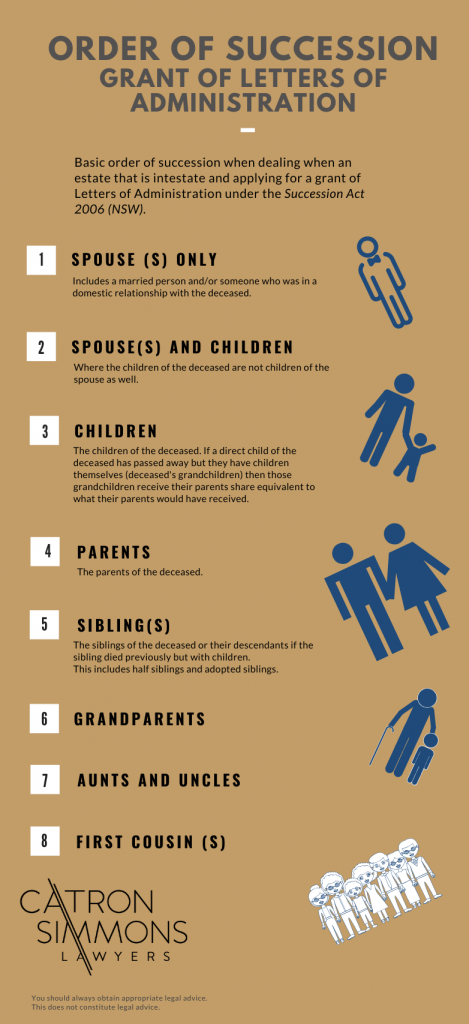If a person dies without a will this is known as intestacy or in intestate. This essentially means that the deceased has not disposed or dealt with their assets properly. In order to properly dispose of the assets administrator must apply to be Granted letters of administration in the NSW Supreme Court.
All property is then dealt with according to a legal formula, this is why it is always better to have a will to ensure that your property goes where you want it to go.
Who inherits the property when there is no will?
Chapter 4 of the Succession Act 2006 (NSW) deals with the distribution of assets in the following way:

Who can apply for the letter of administration?
The grant for administration is typically completed by the ‘next of kin’:-
- spouse of the deceased
- one or more of the next of kin (the application can be joint with a number of administrators)
- the spouse jointly with other relatives.
If there is no ‘next of kin’ or none that are appropriate or willing to apply for the grant the court may grant administration to:-
- NSW Trustee and Guardian
- Any other person the court sees fit.
Do I need to get a letter of administration for title deeds or certificate of titles?
n situations where the deceased was listed as a ‘joint tenant’ on the certificate of title, a grant is not required. The surviving joint tenant needs to complete a form from the NSW Land and Title Office titled ‘Notification of Death’.
A grant of letters of administration will be required in the following circumstances:
- Deceased was the sole registered owner
- deceased was a tenant-in-common
- deceased was a ‘joint tenant’ and the other tenant died before the deceased.
What about the cost of funeral expenses?
The cost of the funeral, administration, debts and other liabilities are removed from the estate before any money is distributed to beneficiaries.
What happens if you die and you don’t have a will?
An eligible family member must provide ‘letters of administration’ to the Supreme Court which is similar to that of Probate (probate occurs if there is a will in place). The relative must provide several documents including:
- An affidavit in regards to the relationship status of the deceased i.e. whether they were is a de facto relationship
- An affidavit in support of the applicant/relative
- An administration bond in some circumstances.
How long does an administrator have before applying for a grant of letters of administration?
Executors should be applying for administration within six (6) months of the death of the deceased.
So why make a will?
A will enables your estate to be distributed how you wish without the need to question your intentions or your wishes by others. Dying without a will can mean that a person may inherit assets or property that you did not intend for instance a parent or sibling you have no contact with.
When someone dies, all existing arrangements with or on behalf of that person including Power of
Attorneys also cease to have effect. That means that even simple things such as billing accounts, bank accounts and/or transactions are frozen pending probate/letters of administration. Having a properly constructed will makes it easier for beneficiaries to gain access to funds, in particular with small estates where probate may not even be required.
If you have children and both you are your spouse die at the same time having a will is critical to ensure that your children are not only looked after but are cared for by the persons, you want.
How can Catron Simmons Lawyers Assist?
Catron Simmons Lawyers are sensitive to your needs and appreciate the difficulties involved with making a will or dealing with an estate and we are here to assist you and your family in this time of need.
